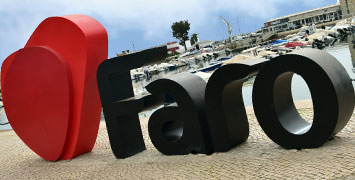Algarve-Tourist.com
The best independent guide to the Algarve
Algarve-Tourist.com
The best independent guide to the Algarve
Lisbon to Faro – the best ways to travel between Faro and Lisbon in 2026
Faro is a charming and historic city that lies at the heart of Portugal's beautiful Algarve region. Its central location makes it the ideal base from which to explore the region’s stunning beaches, coastal towns and inland villages.
Lisbon is the vibrant capital city of Portugal, renowned for its rich history, cultural diversity and delightful yellow trams.
There are many options to choose from when travelling between Faro and Lisbon, including express trains, intercity bus services, and by car along the A2 expressway.
In our opinion, the best way to travel is by the express train, which takes 3 hours 34 minutes and costs €24.00. However, there are cheaper options if you are a budget traveller, such as express buses that can cost as little as €7.99.
This article will explain how best to travel from Lisbon to Faro and includes links to relevant transport companies and some useful travel advice.
Related articles: Lisbon guide – Faro guide
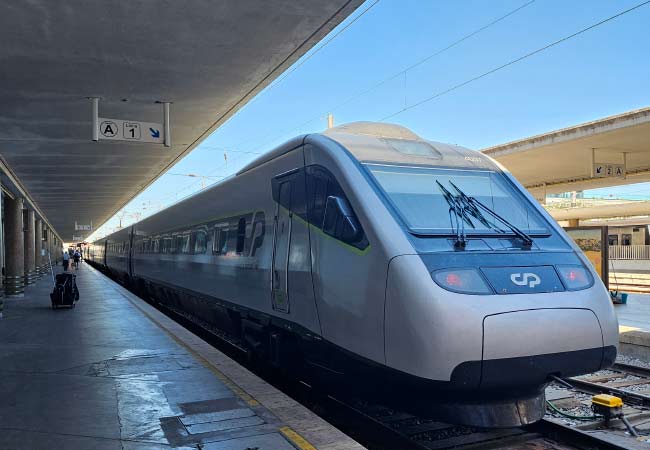
Alfa Pendular (AP) is the express train network of Portugal
Overview of travel between Lisbon and Faro
The are many ways to travel between Lisbon and Faro, which include:
Driving along the A2 expressway – The quickest driving route follows the A2 expressway north/south as it cuts through the centre of the Alentejo region. The route is 277km long and takes just 2 hours and 40 minutes to drive, but the tolls are expensive at €23.30. The A2 is a very dull driving route that passes through the interior of Portugal, with no interesting sights or detours along the way.
Warning: If travelling by car, please be aware of tolls and how to pay them. Details are provided at the end of this guide. Brisa, the company that manages the roads, has recently discovered that foreign tourists are a great source of funds and can be quick to issue fines.
Train travel – The most comfortable method of travel between Faro and Lisbon is by train. Faro is the south terminus of the high-speed rail network, and the journey can be as short as 3 hours 5 minutes on the Alfa Pendular (AP) express train, with a single ticket costing €25.60.
There are slightly cheaper Intercidades (Intercity) trains, with fares costing €24.00, but these have a longer journey time of 3 hours and 34 minutes. In Lisbon, the express trains depart from Oriente train station, and in Faro, the train station is within walking distance of its historic centre. Train travel between Faro and Lisbon is very luxurious, especially in first class, making it the ideal choice if you’re a higher-end traveller.
The national train company of Portugal is Comboios de Portugal (CP). For the latest timetables and ticket booking, please see the Comboios de Portugal website: www.cp.pt
Bus - Rede Expressos – Rede Expressos is the main intercity bus company of Portugal and provides direct services between Lisbon and Faro.
Bus travel is much cheaper than train, and the journey can be as fast as 3 hours 15 minutes. Rede Expressos buses depart from Faro bus station and terminate at Sete Rios bus station in Lisbon. Full details can be seen on the Rede Expressos website: - rede-expressos.pt
Bus, Flixbus – This low-cost bus operator provides the cheapest bus fares between Lisbon and Faro. FlixBus is the best option if you are a budget traveller, with fares as low as €7.99 if booked far enough in advance. The downside to its low-cost business model is that buses are almost always full, and popular routes will sell out.
FlixBus services depart Faro from outside the bus terminal and, in Lisbon, terminate at Oriente bus station. For bookings, see their website - FlixBus
Private transfer – This is the quickest and most convenient way to travel between Faro and Lisbon, however it is also the most expensive. This may be a good option if you are travelling as a group of four.
Advice: Whichever option you choose, it always makes sense to book directly with the transport company instead of third-party ticket resellers. Buying directly will reduce booking fees and ensure each company is more accommodating if there are issues.
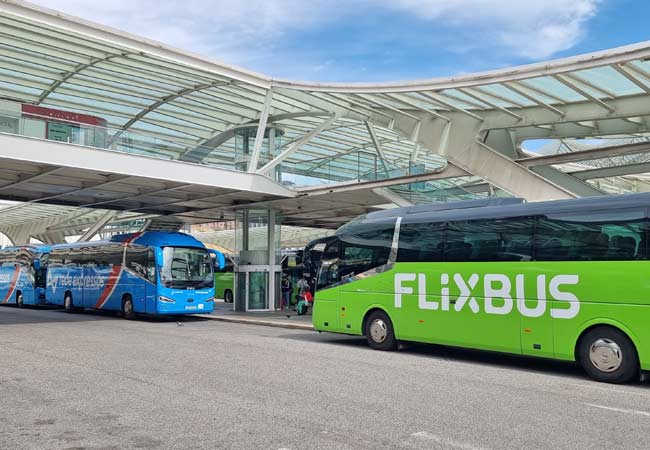
Intercity coach travel in Portugal is safe and comfortable, and both FlixBus and Rede Expressos use modern coaches.
Train, bus, or low-cost bus travel between Lisbon and Faro?
All of the methods detailed in the previous section have their advantages and disadvantages, and the best choice for you will depend on your priorities.
If you are a budget traveller, then FlixBus could be the best option for you. However, if you are an older visitor or prefer comfort over price, then train travel will be the better choice.
When travelling from Lisbon to Faro, we’d choose the train, as it is more spacious and comfortable. Three hours on a bus can feel like a very long time, especially when it is full.
Public transport is exceptionally good value in Portugal; two adult train fares from Lisbon to Faro cost approximately the same as the tolls and fuel when driving.
Insight: We never recommend hiring a car for the journey from Faro to Lisbon. Driving in the Algarve is easy and relaxing, but in Lisbon it can be extremely challenging, with confusing road layouts, constant traffic and limited parking. A car is useful in the Algarve, but not for your time in Lisbon.
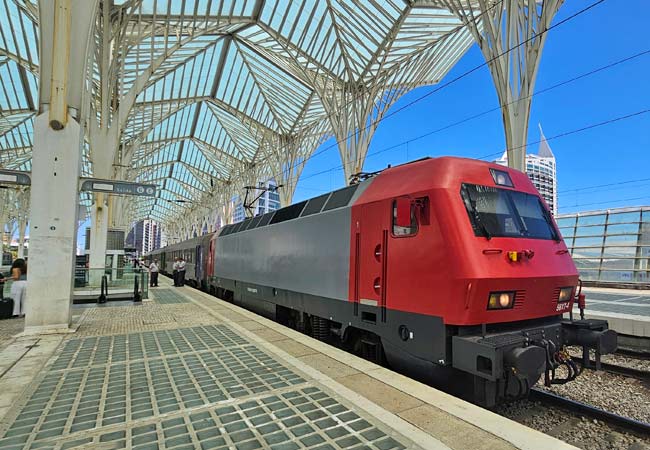
The Intercidades (intercity) train to Faro pulling into Oriente in Lisbon
Book your seats in advance!
The most important thing to take from this article is that you should always book your tickets (for both the train and bus) well in advance of your journey. This will not only save you money, but also guarantees your seats, as popular services will sell out in the peak season.
The intercity trains between Lisbon and Faro have only a limited number of seats, and once they are all sold there will be no more tickets available. There is no standing allowed on the Alfa Pendular or Intercidades services to/from Lisbon.
Buses between Lisbon and Faro can get extremely busy during the summer, and popular services - such as Friday evenings and weekends - will sell out.
Both FlixBus and Rede Expressos use dynamic pricing, where seats purchased well in advance or on low-demand services will be inexpensive. Tickets purchased last minute or on popular routes will cost significantly more. FlixBus is usually cheaper than Rede Expressos during the summer, but it is always worth checking both websites.
Lisbon to Faro by train
Faro is connected to Lisbon by the high-speed railway that extends the length of the country. Along this railway, two types of express trains operate: the Alfa Pendular (AP) and the Intercidades (IC) - intercity. The Alfa Pendular is the more modern train, with a slightly faster route, while the Intercidades is marginally cheaper. An adult single on the Intercidades costs €24.00, while the Alfa Pendular costs €25.60.
There are reductions for children (50 per cent discount), seniors 65+ (50 per cent discount), under 25s (25 per cent discount), or when buying a return ticket (10 per cent reduction). If using an age-based discount, always travel with a valid ID to prove your date of birth.
The two daily Alfa Pendular services to/from the Algarve may be quicker, but their departure times are not that convenient, with one departure early in the morning and the other late in the afternoon. For most tourists, the departure times of the Intercidades services are more suitable.
The latest timetable for services between Lisbon and Faro can be seen on the CP website:
www.cp.pt
(The link opens a PDF, which may be downloaded on mobile phones)
Instead of looking at complex timetables, the Comboios de Portugal website has a very useful search feature:
www.cp.pt/
Insight: When using the CP website, select “Lisboa – Oriente” as the departure location in Lisbon.
Warning: Popular summer services will sell out. We would not advise turning up at the station shortly before the departure time and hoping that there will be seats available on the express trains. Train tickets must be pre-booked, as each ticket is for a designated seat and the number of seats is limited.
Insight: There can be confusion when the train arrives as to which carriage your seats are in. On your ticket, you will see the words ‘carruagem’ (carriage) and ‘lugar’ (seat number). Carriage number ‘21’ means the first carriage of second class – and not that there are 21 carriages! The carriage number will be displayed on a small sign close to each door.
Train stations in Lisbon and Faro
All trains to Faro depart Lisbon from the Estação do Oriente.
Oriente station is situated to the northeast of Lisbon in the Parque das Nações district, GPS: 38.767, -9.099 (link to Google Maps). The Estação do Oriente is connected to the red metro line, which also serves the airport.
Oriente is a busy transport interchange with metro, bus and train stations, but it is easy to navigate, with clear signage and plenty of lifts. Opposite the station is the modern Vasco da Gama shopping centre, where there are numerous restaurants and cafes.
The train station in Faro is located just to the west of the historic centre (GPS 37.0186, -7.939) and is only a 200m walk to the marina and city centre.
Insight: It is a large step down from the carriage to the station at Faro. If you have mobility issues, or are travelling with young children, it is advisable to chat with the guard if help or extra time is needed.
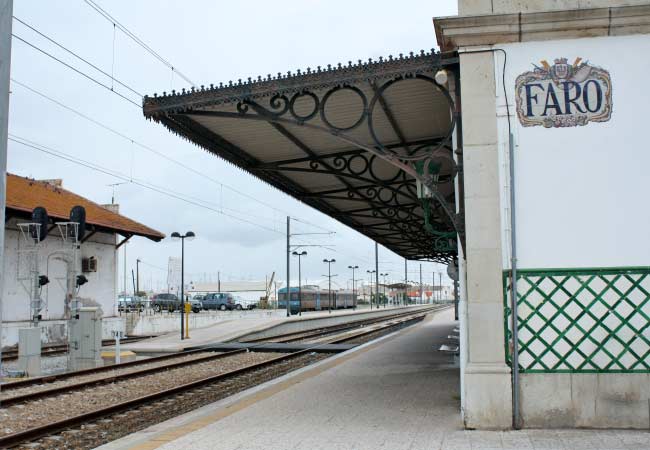
Faro train station
Onward travel from Faro station
Faro is the main train station of the Algarve and connects to the regional railway that extends along the length of the region.
If your final destination is to the east (such as Tavira, Olhão or Monte Gordo), you will connect to the regional train at Faro. If you are heading west (to Lagos or Portimão), it is better to exit the express train at Tunes – where the regional train waits for the express trains.
The train stations in the Algarve are much smaller, often with two platforms and a handful of services per day. Most stations have a ticket office, a café and not much else.
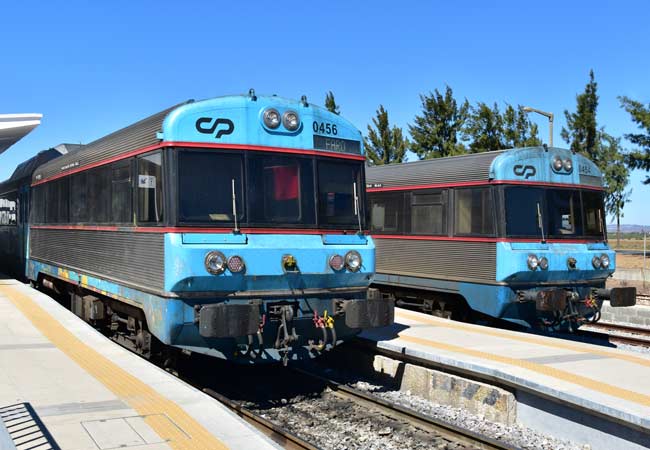
The Algarve regional train
Faro to Porto
There are two daily train services between Faro and Porto. These are the Alfa Pendular (AP) services that leave in the early morning and early evening. The Faro to Porto journey takes 5 hours 58 minutes, with tickets for this service costing €77.90/€57.40 (1st/2nd class).
The train is the recommended means of travel for such long distances, and the latest timetable can be seen on the CP website: www.cp.pt/
Related articles: The Algarve to Porto - Guide to Porto
Lisbon to Faro by bus
Bus travel in Portugal is safe and inexpensive, with the coaches used by Rede Expressos and FlixBus being both smart and modern.
Rede Expressos is the main intercity bus company of Portugal, covering many routes throughout the country. It is a conglomerate of many smaller bus companies, and the Lisbon to Lagos service may be provided by Renex, Mundial Turismo or Rede Expressos.
FlixBus is a low-cost bus company that provides services along many of the more popular routes in the country. Since it started operating, the price of bus travel has significantly fallen and is now much cheaper than train travel. FlixBus services will be cheaper when booked in advance, but its services will sell out during popular times. Also, expect FlixBus services to be much busier than the Rede Expressos equivalent.
Rede Expressos - rede-expressos.pt/
Flixbus - FlixBus
Both bus companies use dynamic pricing, with the cost of tickets increasing closer to the departure time and with demand.
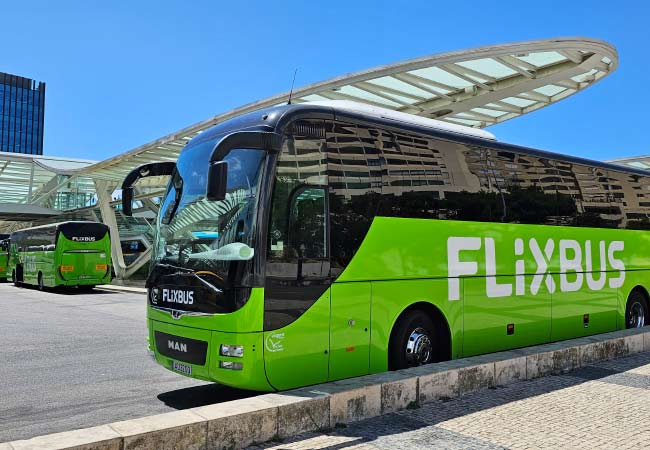
FlixBus in Oriente bus station.
Lisbon and Faro bus stations
FlixBus departs from the Estação do Oriente bus station (GPS: 38.767, -9.099), which is connected to the train station. This is in the Parque das Nações district and is connected to the red metro line by the Oriente metro station.
The majority of Rede Expressos buses depart Lisbon from Sete Rios bus station (GPS: 38.741, -9.166), but certain services operated by Renex depart/terminate at Oriente. Sete Rios bus station is connected to the blue metro line by the Jardim Zoológico metro station.
Advice: Always check your ticket for the departure location in Lisbon, especially when travelling with Rede Expressos buses.
Both Sete Rios and Estação do Oriente are large and modern bus stations with late-closing ticket offices and generally good facilities. Lisbon bus stations are safe, but be sure to use common sense when passing through, as pickpockets are always on the search for easy opportunities.
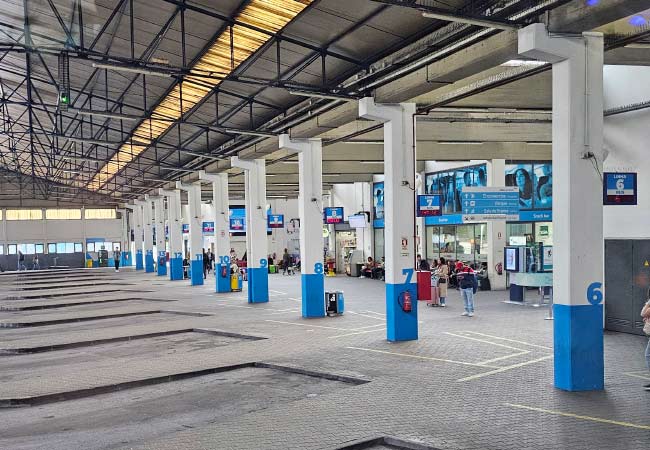
Sete Rios bus station in Lisbon.
In Faro, Rede Expressos buses depart from Faro bus station, the Terminal Rodoviário de Faro (GPS: 37.0171, -7.937). The bus station is located close to the train station and is a short walk from the historic centre.
FlixBus services depart from the opposite side of Faro, on the Avenida Eng. Joaquim L. Belchior (GPS: 37.0118, -7.9305), which is a 15-minute walk from Faro bus station. The FlixBus stop is purely a bus stop with no facilities.
Insight: Always confirm the departure location for your FlixBus journey, which will be shown on the website, as departure locations have been moved in the past.
The FlixBus bus stop in Faro.
Driving between Lisbon and Faro via the A2
The journey from Lisbon to Faro follows the A2 expressway. This road has tolls, and the cost will be €23.30, almost the same as the cost of a train ticket.
The tolls are paid through the Via Verde transponder, which you should ask for if you are renting a car in Portugal. Full details are provided on their website:
visitors.viaverde.pt
If you are planning on driving a foreign registered car, please see this website:
www.portugaltolls.com/
It is highly recommended to have a Via Verde transponder while driving in Portugal, as many expressways only have automatic toll collection. To estimate the cost of tolls in Portugal, you can use the website:
https://
The A2 is a very dull drive through the interior of the Alentejo region. There are no noteworthy towns or sights along the route. For a guide on where to stop along the A2 please click here.
Do you need a car for Lisbon?
Having a car in Faro is great for exploring and discovering hard-to-reach beaches or villages, but in Lisbon it can be a hindrance. Lisbon has excellent public transport options, and the ride-hailing apps (such as Uber or Bolt) are inexpensive for private travel. Driving in Lisbon can be very demanding, with heavy traffic, erratic driving and severely limited car parking.
We would recommend having a car for Faro, but there is no need for one in Lisbon.
Our most popular guides for Faro and the Algarve
Expert Insight: These guides are curated by Philip Giddings, a travel writer with over 25 years of local experience in Portugal. Since 2008, Phil has focused on providing verified, on-the-ground advice for the Algarve region, supported by deep cultural ties through his Portuguese family. Read the full story here.





















